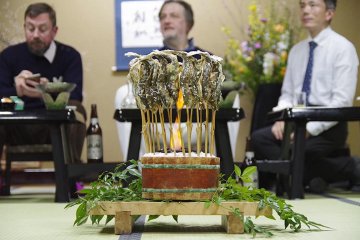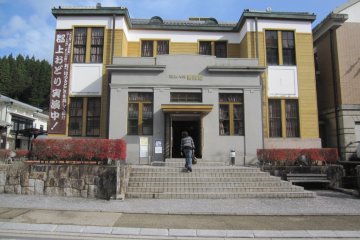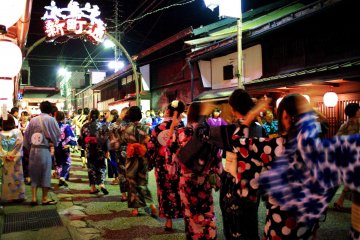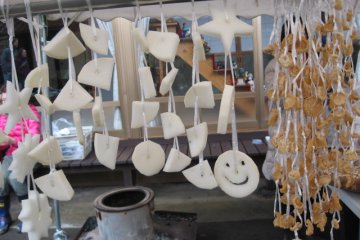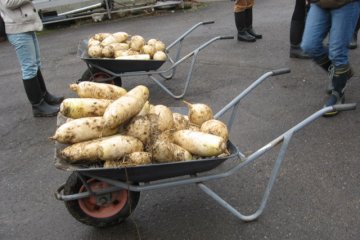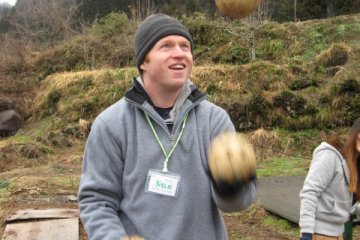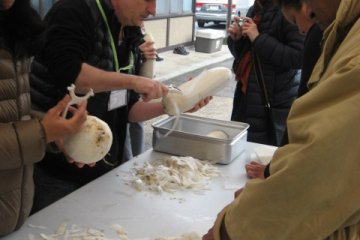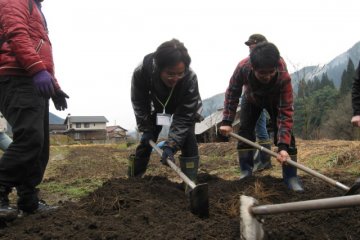Right before the mountains and fields completely thawed out and green returned to Gujo Hachiman, I had the opportunity to get off the beaten path and enjoy a bit of the slow life of traditional Japan. While the city’s lively summer dance festival is one of the most popular in the country, that’s not all it has to offer. I left Gifu City for an overnight trip to the countryside, and came back relaxed and inspired. If you want to recharge your spirits, why not leave urban life behind and return to a slower-paced way of life in the backwoods of Gujo Hachiman.
After a peaceful and toasty night’s rest at Airi Minshuku, I was ready to take on the day with some Daikon (white radish) hunting. The tour group reconvened at Shimoda Minshuku ready to put in a little effort to unearth the treasures. Provided with boots and snazzy gardening gloves we walked along the Kera River to the field. The daikon had already been plucked and buried in mid-autumn to be preserved during the winter months. After a safety explanation regarding the hoes, we were each given a chance to dig up a couple of daikon. You couldn’t just hack away at the dirt, a little gentleness was required. While the first three people started us off. I waited for the first bit of white to be uncovered. A man from Germany was the first to strike gold. Watching the others I was confident it wouldn’t be hard to find one. So, when it was my turn I was ready to go. Scrape, scrape, scrape. “Any day now” kept popping into my head. Someone shouted an encouraging, "Ganbatte Michelle!" (Hang in there!) Scrape, scrape, scrape. No daikon. When I finally saw white you’d think I was a kid who just found an Easter egg. Had to get in there and dig the rest of it out with my hands. It was so adorable and round. A good size for juggling too.
Daikon wasn’t the only thing of interest out there. A long and healthy-looking earthworm came out to see what the ruckus top side was and caught the attention of the participants. Nature! Everyone was amazed by its size. Must’ve been due to the rich countryside soil. I guess no matter how old you are, earthworms are still fascinating.
Back to the daikon. We weren’t finished yet. The haul was wheelbarrowed back to the minshuku where we were about to prepare the daikon for drying. Just like they’ve been doing for generations. Lots of peeling, cutting, stringing up, dunking, and good conversation with the tour members and locals ensued. The daikon are dried for around two weeks depending on the weather. Over time the firm crisp discs shrivel up to a fraction of their original size, but when you soak them in water they’ll fatten up again. We each got to take home two kinds of dried daikon. And the work gloves - if you wanted them. (I did!) Not your usual souvenirs.
Being outdoors in the countryside and doing something out of the ordinary was refreshing. This and the other events of the tour (mochi pounding, arts and crafts, mini-tour of the center of town) were put on by a group of minshuku landladies who call themselves Bistarli Momrs. Bistarai is Nepali for slowly. They formed the organization several years ago to introduce the rich culture of Gujo in a relaxing way to tourists. They can organize different activities depending on the season throughout the year. The initiative taken by these older women was quite inspiring. Through their words and the time they spent with us you could tell how much thought and care went into creating such a memorable experience.
Thank you ladies!



